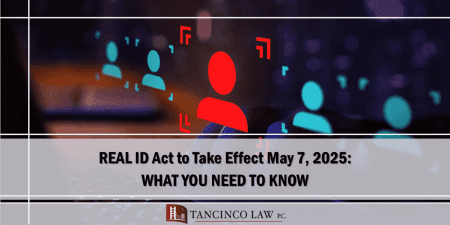After several delays, the enforcement of the REAL ID Act — originally enacted in 2005 — will finally take effect in just a few weeks. It wasn’t until 2020, fifteen years after the law was passed, that all 50 states became compliant with its licensing requirements, which contributed to the prolonged delay in implementation. On May 7, 2025, the REAL ID Act will be fully enforced across the United States. For many non U.S. citizens— especially those who use state-issued IDs or driver’s licenses as their primary form of identification — this date is an important one. Here’s what you need to know, what happens if you don’t yet have a REAL ID, and what you can still do before the deadline.

The REAL ID Act
The REAL ID Act, passed by Congress in 2005, was designed to set federal standards for the issuance of identification documents, such as driver’s licenses and state-issued ID cards. It aims to enhance security measures after 9/11, making it more difficult for fraudulent documents to be used to access federal facilities or board commercial flights.
Starting May 7, 2025, you will not be able to use a standard state driver’s license or ID to board a domestic flight or enter federal buildings — including courthouses and military bases — unless it is REAL ID-compliant.
How Do You Know If You Have a REAL ID?
REAL ID-compliant licenses and ID cards generally have a star on the upper portion of the card. If your ID does not have this star, it may not meet federal requirements. Each state may look slightly different, but the star is a common indicator.
If you’re unsure, check with your state’s Department of Motor Vehicles (DMV) or look at your license to see if it bears the REAL ID star.
Why Does This Matter for Immigrants?
For many immigrants — especially those who are unlawfully present —your state ID may be your main form of identification. Without a REAL ID, you may:
- Be denied boarding for domestic flights.
- Be refused entry into federal buildings.
- Face additional scrutiny when trying to access certain government services.
This is particularly important if you need to attend immigration court, visit USCIS field offices, or travel domestically within the U.S. for personal or legal matters.
Can Immigrants who are in Unlawful Status Get a REAL ID?
Unfortunately, most immigrants who are in unlawful status do not qualify for REAL ID-compliant licenses under federal law. States that issue driver’s licenses to immigrants with no legal status typically provide non-compliant IDs—which are only valid for driving but not for federal identification purposes like boarding flights or entering federal buildings. This is the type of IDs some States like the State of California issue to those with unlawful status and thus, are not REAL ID compliant.
If you are not in possession of a green card or a validly issued REAL ID compliant State ID, you will need to use alternative federally-accepted documents for travel or ID purposes, such as:
- A valid foreign passport
- A valid Employment Authorization Document (EAD)
For traveling purposes for example, the above documents like the passport issued by your country of national even if does not contain a valid visa will suffice as a form of identification for traveling purposes within the United States.
What You Can Still Do Before May 7, 2025
If you are eligible, here’s how to get your REAL ID before the deadline:
- Make an appointment at your local DMV.
Many states are still experiencing delays, so book as early as possible. - Bring the required documents, including:
- Proof of identity (e.g., valid passport, Green Card)
- Proof of lawful presence (e.g., I-94, work permit)
- Proof of Social Security Number (SSN card, pay stub, W-2)
- Two proofs of residency (utility bill, lease, etc.)
- Apply before May 7, 2025.
Don’t wait until the last minute! Lines will get longer as the deadline approaches
Consult With Legal Counsel
Immigrants who are lawfully present in the U.S. should act now to avoid travel disruptions or problems accessing federal services. If you’re unsure whether you qualify or what documents you need, speak with your immigration attorney or contact your state DMV for guidance.
At Tancinco Law, we’re here to help our clients stay informed and prepared. Don’t wait until the last minute—May 7 is closer than you think.
If you have questions about your immigration status or your eligibility for REAL ID, schedule a consultation with our office today.
~
If you would like to know how to set an appointment with Tancinco Law, click here.


